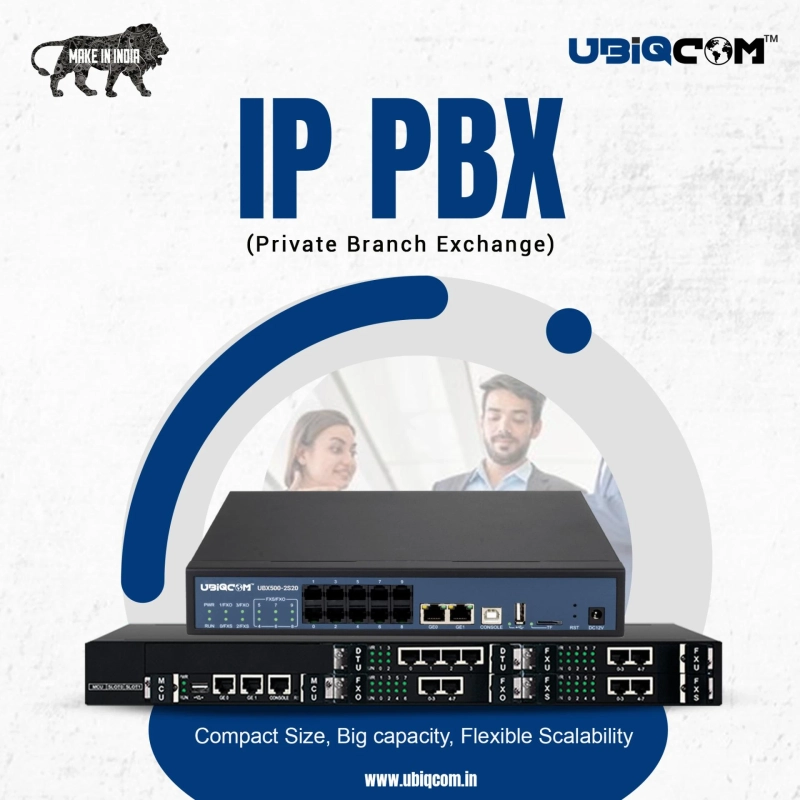In today’s fast-paced digital world, seamless communication is vital for business success. Whether you’re a small startup or a large enterprise, having a reliable, scalable, and feature-rich communication system is crucial. This is where IP PBX (Internet Protocol Private Branch Exchange) systems come into play.
In this blog, we’ll explore what IP PBX is, how it works, its benefits, key features, and why it's becoming the backbone of business communication.
What is IP PBX?
An IP PBX is a telephone switching system within a private network that enables voice communication over the Internet (VoIP – Voice over IP). Unlike traditional PBX systems that use analog lines and hardware, an IP PBX leverages digital IP-based networks to manage and route calls efficiently.
Essentially, it combines traditional PBX functionality with the power of IP technology, allowing businesses to make voice calls using data networks rather than outdated copper wires.
How Does IP PBX Work?
IP PBX systems manage voice traffic using VoIP protocols such as SIP (Session Initiation Protocol). Here's a basic overview of how it works:
- Call Initiation: When a user dials a number, the IP PBX initiates the call using SIP or other VoIP protocols.
- Call Routing: The system checks the destination (internal or external) and routes the call accordingly.
- Data Conversion: Voice signals are converted into digital packets and transmitted over the IP network.
- Media Gateway (if needed): If the call needs to connect to the traditional telephone network (PSTN), a gateway is used to convert IP to analog.
An IP PBX system can be deployed as on-premise hardware, software, or a hosted cloud-based solution.
Key Features of an IP PBX System
Modern IP PBX systems offer a wide range of advanced communication features that go far beyond traditional telephony:
1. Voicemail to Email
Messages left on voicemail can be converted into audio files and sent to the user’s email for convenience.
2. Call Forwarding and Routing
Smart routing rules based on time, caller ID, or agent availability help optimize business workflows.
3. Interactive Voice Response (IVR)
Automated menus guide callers to the appropriate department or individual without manual intervention.
4. Call Recording
Record and store calls for training, quality assurance, and compliance.
5. Conference Calling
Easily set up multi-party conference calls with participants from anywhere in the world.
6. Mobile and Remote Access
Remote workers can use their smartphones or laptops as office extensions using softphones or mobile apps.
7. Scalability
Add or remove extensions, lines, and features without major hardware upgrades.
Benefits of Using an IP PBX for Businesses
Implementing an IP PBX solution brings a host of advantages that can improve communication efficiency and reduce operational costs:
1. Cost Savings
VoIP calls, especially international or long-distance, are significantly cheaper than traditional PSTN calls. Businesses can eliminate or reduce telephone line rental charges.
2. Easy Installation and Maintenance
IP PBX systems use standard computer hardware and Ethernet cabling, making installation straightforward. Software-based systems are easier to manage and update.
3. Improved Productivity
With features like voicemail-to-email, CRM integration, and call analytics, employees can manage calls more efficiently and improve response times.
4. Flexible Deployment
Choose between on-premise, cloud-based, or hybrid deployment models based on your business requirements and budget.
5. Unified Communication
Integrate voice, video, messaging, and conferencing into a single platform for better collaboration and communication.
6. Enhanced Customer Experience
Auto-attendants, call queues, and real-time call monitoring improve customer service and response time.
On-Premise vs Cloud-Based IP PBX
When choosing an IP PBX system, businesses can opt for an on-premise or a cloud-based solution.
On-Premise IP PBX
- Hardware-based installation within the office
- Greater control and customization
- Requires in-house IT staff and maintenance
- Higher upfront cost
Cloud-Based IP PBX
- Hosted by a service provider
- Low upfront cost and minimal maintenance
- Scalable and ideal for remote teams
- Monthly or yearly subscription fees
Both options have their advantages. Small businesses often prefer cloud IP PBX for its cost-effectiveness, while large enterprises may opt for on-premise deployments for greater control.
IP PBX vs Traditional PBX: A Comparison
FeatureTraditional PBXIP PBXTechnologyAnalogDigital (VoIP)InstallationComplex and expensiveSimple and cost-effectiveScalabilityLimitedHighly scalableFeaturesBasicAdvanced (IVR, call logs, etc.)CostHigh operational costLower call & maintenance costRemote Work SupportNoYes
Who Should Use an IP PBX System?
An IP PBX is ideal for:
- Startups and SMEs looking for cost-effective, scalable communication
- Large enterprises with multiple departments or branches
- Call centers and BPOs that rely on high-volume call handling
- Remote or hybrid teams needing mobile access
- Businesses aiming for unified communications
Choosing the Right IP PBX Solution
When selecting an IP PBX system for your business, consider the following:
- Size of your organization and expected call volume
- Required features (e.g., IVR, call recording, CRM integration)
- Budget – upfront and ongoing costs
- In-house technical expertise
- Integration capabilities with your existing tools
- Security features like SIP encryption and firewalls
Some popular IP PBX brands in the market include Asterisk, 3CX, FreePBX, Grandstream, and Yeastar. Many vendors also offer managed services tailored to Indian ISPs and enterprises.
Final Thoughts
The future of business communication lies in flexibility, mobility, and cost-efficiency—and IP PBX systems deliver all that and more. Whether you're upgrading from a legacy PBX or starting fresh, IP PBX gives you a modern, reliable, and scalable telephony solution that can grow with your business.



